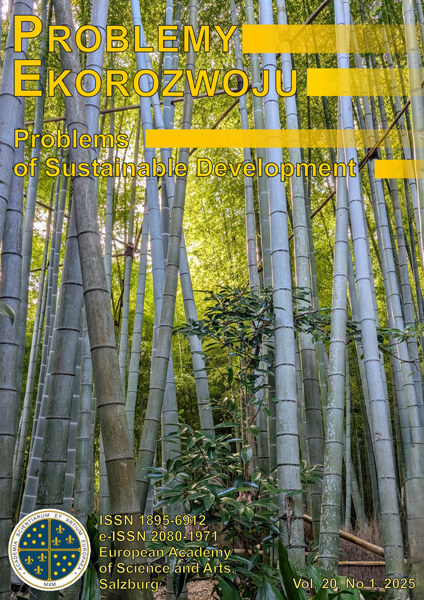Wpływ zintegrowanych systemów OZE na zaopatrzenie w energię – aspekty pozytywne i ryzyka
Vladimir Ivanovich Velkin
Ural Federal University named after B. N. Yeltsin, Yekaterinburg, Russian Federation (Federacja Rosyjska)
Sergei Evgenevich Shcheklein
Ural Federal University named after B. N. Yeltsin, Yekaterinburg, Russian Federation (Federacja Rosyjska)
Abstrakt
OZE (odnawialne źródła energii) odgrywają istotną role w kontekście rozwoju zrównoważonego, jako alternatywę dla spalania paliw kopalnych i energetyki jądrowej.
W tym artykule opisano klaster technologiczny OZE – zintegrowany system, na który składają się urządzenia wykorzystujące różne rodzaje OZE. Pokazuje, że nieprzewidywalność dostaw energii odnawialnej ma wpływ na niezawodność dostaw energii. Rozważono wpływ dywersyfikacji OZE na poprawę jakości systemu zasilania i zmniejszenie ryzyka związanego ze stratami energii. W oparciu o symulację matematyczną autorzy proponują innowacyjne rozwiązanie pozwalające określić najbardziej efektywną konfigurację sprzętową zintegrowanego systemu energetycznego – klaster OZE. Opracowano i zarejestrowano programy komputerowe umożliwiające obliczenie zintegrowanego systemu energetycznego na przykładzie Federacji Rosyjskiej.
Za kryterium optymizacji przyjęto minimalny koszt wytwarzania 1 kWh energii elektrycznej przez cały system odnawialnych źródeł energii. Obliczenia odnoszącej się do optymalnej kombinacji odnawialnych źródełe energii oparte są na wariancji zmiennych losowych i dokładnych danych odnoszących się do warunków klimatycznych (a więc uwzględniono o wiele więcej, niż średnie dane dla danego roku). Takie podejście pozwala na zwiększenie dokładności obliczeń I 25-40%. W konsekwencji instalacja będzie mniejsza i lepiej dostosowana do potrzeb, co pozwoli na obniżenie ceny wytwarzania 1kWh energii elektrycznej.
Słowa kluczowe:
odnawialne źródła energii, klaster technologiczny OZE, odnawialny system zasilania, niezawodność systemu zasilaniaBibliografia
KNIGHT F., 1921, Risk, Uncertainty and Profit, Houghton Mifflin, Boston and New York.
Google Scholar
BENDAT J., PIERSOL A., 1971, Random data: Analysis and measurement processes, Wiley Interscience, New York.
Google Scholar
ESIPOV Y.V., SAMSONOV F.A., CHEREMISIN A.I., 2008, Monitoring and evaluation of system risks, Publishing house LKI, Moscow.
Google Scholar
SHARPE W.F., 1963, A Simplified Model for Portfolio Analysis, in: Management Science, vol. 9(2), p. 277-293.
Google Scholar
VELKIN V., 2013, The use of the graphical model for the RES cluster for determining the optimal composition of the equipment of renewable energy sources, in: World Applied Sciences Journal, vol. 29(9), p. 1343-1348.
Google Scholar
TOBIN J., 1965, The Theory of Portfolio Selection, in: The Theory of Interest Rate, eds. Hahn F.N., Brechling F.R.P., Macmillan, London.
Google Scholar
MARKOWITZ H.M., 1952, Portfolio selection, in: Journal of Finance, vol. 7(1), p. 77-91.
Google Scholar
MARKOWITZ H.M., 1990, Mean-Variance Analysis in Portfolio Choice and Capital Markets, Blackwell, Cambridge, MA.
Google Scholar
FULZELE J.B., DUTT S., 2012, Optimium Planning of Hybrid Renewable Energy System Using HOMER, in: International Journal of Electrical and Computer Engineering, vol. 2(1), p. 68-74.
Google Scholar
LAKHOUA M.N., 2014, System Analysis of a Hybrid Renewable Energy System, in: International Journal of Electrical and Computer Engineering, vol. 4(3), p. 343-350.
Google Scholar
Autorzy
Vladimir Ivanovich VelkinUral Federal University named after B. N. Yeltsin, Yekaterinburg, Russian Federation Federacja Rosyjska
Autorzy
Sergei Evgenevich ShchekleinUral Federal University named after B. N. Yeltsin, Yekaterinburg, Russian Federation Federacja Rosyjska
Statystyki
Abstract views: 18PDF downloads: 7
Licencja

Utwór dostępny jest na licencji Creative Commons Uznanie autorstwa – Na tych samych warunkach 4.0 Miedzynarodowe.




